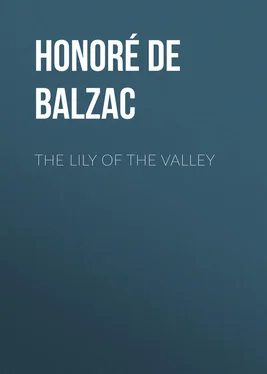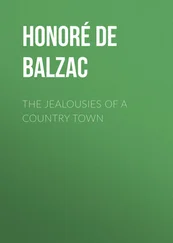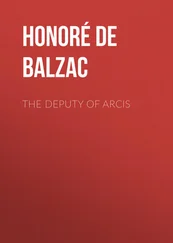Honoré Balzac - The Lily of the Valley
Здесь есть возможность читать онлайн «Honoré Balzac - The Lily of the Valley» — ознакомительный отрывок электронной книги совершенно бесплатно, а после прочтения отрывка купить полную версию. В некоторых случаях можно слушать аудио, скачать через торрент в формате fb2 и присутствует краткое содержание. Жанр: literature_19, foreign_antique, foreign_prose, на английском языке. Описание произведения, (предисловие) а так же отзывы посетителей доступны на портале библиотеки ЛибКат.
- Название:The Lily of the Valley
- Автор:
- Жанр:
- Год:неизвестен
- ISBN:нет данных
- Рейтинг книги:4 / 5. Голосов: 1
-
Избранное:Добавить в избранное
- Отзывы:
-
Ваша оценка:
- 80
- 1
- 2
- 3
- 4
- 5
The Lily of the Valley: краткое содержание, описание и аннотация
Предлагаем к чтению аннотацию, описание, краткое содержание или предисловие (зависит от того, что написал сам автор книги «The Lily of the Valley»). Если вы не нашли необходимую информацию о книге — напишите в комментариях, мы постараемся отыскать её.
The Lily of the Valley — читать онлайн ознакомительный отрывок
Ниже представлен текст книги, разбитый по страницам. Система сохранения места последней прочитанной страницы, позволяет с удобством читать онлайн бесплатно книгу «The Lily of the Valley», без необходимости каждый раз заново искать на чём Вы остановились. Поставьте закладку, и сможете в любой момент перейти на страницу, на которой закончили чтение.
Интервал:
Закладка:
The Lepitre establishment was in the old Joyeuse mansion where, as in all seignorial houses, there was a porter’s lodge. During a recess, which preceded the hour when the man-of-all-work took us to the Charlemagne Lyceum, the well-to-do pupils used to breakfast with the porter, named Doisy. Monsieur Lepitre was either ignorant of the fact or he connived at this arrangement with Doisy, a regular smuggler whom it was the pupils’ interest to protect, – he being the secret guardian of their pranks, the safe confidant of their late returns and their intermediary for obtaining forbidden books. Breakfast on a cup of “cafe-au-lait” is an aristocratic habit, explained by the high prices to which colonial products rose under Napoleon. If the use of sugar and coffee was a luxury to our parents, with us it was the sign of self-conscious superiority. Doisy gave credit, for he reckoned on the sisters and aunts of the pupils, who made it a point of honor to pay their debts. I resisted the blandishments of his place for a long time. If my judges knew the strength of its seduction, the heroic efforts I made after stoicism, the repressed desires of my long resistance, they would pardon my final overthrow. But, child as I was, could I have the grandeur of soul that scorns the scorn of others? Moreover, I may have felt the promptings of several social vices whose power was increased by my longings.
About the end of the second year my father and mother came to Paris. My brother had written me the day of their arrival. He lived in Paris, but had never been to see me. My sisters, he said, were of the party; we were all to see Paris together. The first day we were to dine in the Palais-Royal, so as to be near the Theatre-Francais. In spite of the intoxication such a programme of unhoped-for delights excited, my joy was dampened by the wind of a coming storm, which those who are used to unhappiness apprehend instinctively. I was forced to own a debt of a hundred francs to the Sieur Doisy, who threatened to ask my parents himself for the money. I bethought me of making my brother the emissary of Doisy, the mouth-piece of my repentance and the mediator of pardon. My father inclined to forgiveness, but my mother was pitiless; her dark blue eye froze me; she fulminated cruel prophecies: “What should I be later if at seventeen years of age I committed such follies? Was I really a son of hers? Did I mean to ruin my family? Did I think myself the only child of the house? My brother Charles’s career, already begun, required large outlay, amply deserved by his conduct which did honor to the family, while mine would always disgrace it. Did I know nothing of the value of money, and what I cost them? Of what use were coffee and sugar to my education? Such conduct was the first step into all the vices.”
After enduring the shock of this torrent which rasped my soul, I was sent back to school in charge of my brother. I lost the dinner at the Freres Provencaux, and was deprived of seeing Talma in Britannicus. Such was my first interview with my mother after a separation of twelve years.
When I had finished school my father left me under the guardianship of Monsieur Lepitre. I was to study the higher mathematics, follow a course of law for one year, and begin philosophy. Allowed to study in my own room and released from the classes, I expected a truce with trouble. But, in spite of my nineteen years, perhaps because of them, my father persisted in the system which had sent me to school without food, to an academy without pocket-money, and had driven me into debt to Doisy. Very little money was allowed to me, and what can you do in Paris without money? Moreover, my freedom was carefully chained up. Monsieur Lepitre sent me to the law school accompanied by a man-of-all-work who handed me over to the professor and fetched me home again. A young girl would have been treated with less precaution than my mother’s fears insisted on for me. Paris alarmed my parents, and justly. Students are secretly engaged in the same occupation which fills the minds of young ladies in their boarding-schools. Do what you will, nothing can prevent the latter from talking of lovers, or the former of women. But in Paris, and especially at this particular time, such talk among young lads was influenced by the oriental and sultanic atmosphere and customs of the Palais-Royal.
The Palais-Royal was an Eldorado of love where the ingots melted away in coin; there virgin doubts were over; there curiosity was appeased. The Palais-Royal and I were two asymptotes bearing one towards the other, yet unable to meet. Fate miscarried all my attempts. My father had presented me to one of my aunts who lived in the Ile St. Louis. With her I was to dine on Sundays and Thursdays, escorted to the house by either Monsieur or Madame Lepitre, who went out themselves on those days and were to call for me on their way home. Singular amusement for a young lad! My aunt, the Marquise de Listomere, was a great lady, of ceremonious habits, who would never have dreamed of offering me money. Old as a cathedral, painted like a miniature, sumptuous in dress, she lived in her great house as though Louis XV. were not dead, and saw none but old women and men of a past day, – a fossil society which made me think I was in a graveyard. No one spoke to me and I had not the courage to speak first. Cold and alien looks made me ashamed of my youth, which seemed to annoy them. I counted on this indifference to aid me in certain plans; I was resolved to escape some day directly after dinner and rush to the Palais-Royal. Once seated at whist my aunt would pay no attention to me. Jean, the footman, cared little for Monsieur Lepitre and would have aided me; but on the day I chose for my adventure that luckless dinner was longer than usual, – either because the jaws employed were worn out or the false teeth more imperfect. At last, between eight and nine o’clock, I reached the staircase, my heart beating like that of Bianca Capello on the day of her flight; but when the porter pulled the cord I beheld in the street before me Monsieur Lepitre’s hackney-coach, and I heard his pursy voice demanding me!
Three times did fate interpose between the hell of the Palais-Royal and the heaven of my youth. On the day when I, ashamed at twenty years of age of my own ignorance, determined to risk all dangers to put an end to it, at the very moment when I was about to run away from Monsieur Lepitre as he got into the coach, – a difficult process, for he was as fat as Louis XVIII. and club-footed, – well, can you believe it, my mother arrived in a post-chaise! Her glance arrested me; I stood still, like a bird before a snake. What fate had brought her there? The simplest thing in the world. Napoleon was then making his last efforts. My father, who foresaw the return of the Bourbons, had come to Paris with my mother to advise my brother, who was employed in the imperial diplomatic service. My mother was to take me back with her, out of the way of dangers which seemed, to those who followed the march of events intelligently, to threaten the capital. In a few minutes, as it were, I was taken out of Paris, at the very moment when my life there was about to become fatal to me.
The tortures of imagination excited by repressed desires, the weariness of a life depressed by constant privations had driven me to study, just as men, weary of fate, confine themselves in a cloister. To me, study had become a passion, which might even be fatal to my health by imprisoning me at a period of life when young men ought to yield to the bewitching activities of their springtide youth.
This slight sketch of my boyhood, in which you, Natalie, can readily perceive innumerable songs of woe, was needful to explain to you its influence on my future life. At twenty years of age, and affected by many morbid elements, I was still small and thin and pale. My soul, filled with the will to do, struggled with a body that seemed weakly, but which, in the words of an old physician at Tours, was undergoing its final fusion into a temperament of iron. Child in body and old in mind, I had read and thought so much that I knew life metaphysically at its highest reaches at the moment when I was about to enter the tortuous difficulties of its defiles and the sandy roads of its plains. A strange chance had held me long in that delightful period when the soul awakes to its first tumults, to its desires for joy, and the savor of life is fresh. I stood in the period between puberty and manhood, – the one prolonged by my excessive study, the other tardily developing its living shoots. No young man was ever more thoroughly prepared to feel and to love. To understand my history, let your mind dwell on that pure time of youth when the mouth is innocent of falsehood; when the glance of the eye is honest, though veiled by lids which droop from timidity contradicting desire; when the soul bends not to worldly Jesuitism, and the heart throbs as violently from trepidation as from the generous impulses of young emotion.
Читать дальшеИнтервал:
Закладка:
Похожие книги на «The Lily of the Valley»
Представляем Вашему вниманию похожие книги на «The Lily of the Valley» списком для выбора. Мы отобрали схожую по названию и смыслу литературу в надежде предоставить читателям больше вариантов отыскать новые, интересные, ещё непрочитанные произведения.
Обсуждение, отзывы о книге «The Lily of the Valley» и просто собственные мнения читателей. Оставьте ваши комментарии, напишите, что Вы думаете о произведении, его смысле или главных героях. Укажите что конкретно понравилось, а что нет, и почему Вы так считаете.












